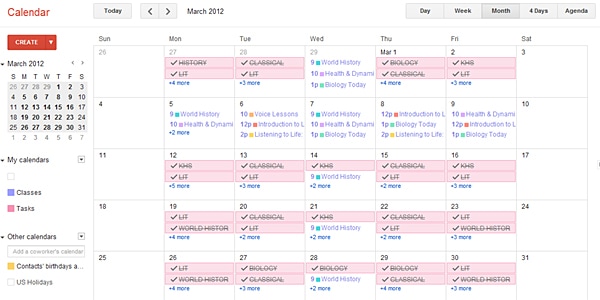
If you’re a student, you have probably heard the phrase “Social life, grades, sleep: Pick two.”
As a college student, it’s completely normal to feel stressed out or anxious from time to time – in fact, it’s something we CF writers struggle with ourselves. (In the past, we’ve talked about how to beat final exam stress and midterm stress, proven ways to destress at home, and even how to meditate to clear your mind.)
To an extent, anxiety and stress can even be healthy… but it’s managing them that’s the challenge.
Feeling a little overwhelmed? Try these tips and tricks to keep your anxiety and stress in check!
Table of Contents
Revise Your Schedule

When everything starts to pile up, sometimes you need to change things around in order to get everything done. You’ll be surprised at how spacing things out and prioritizing helps you feel less overwhelmed. Don’t leave everything for last minute, either. Procrastination just causes unneeded stress. Remember: One thing at a time!
Need a schedule change or help organizing all your tasks? Check out our post on how to keep a schedule!
Take a Night Off

Just because you’re busy with a lot of work, that doesn’t mean you need to neglect your social life and resting time! It would be unhealthy to just work all the time. Too much stress on your body can cause illness, which would likely leave you even more behind on your work, creating a vicious cycle of anxiety and stress.
If possible, shift some of your tasks on your schedule and plan to take a full night off. Really not able to swing it? Try a study group and get your work and social time done together! Rather be alone? Set aside an hour to yourself to watch a show on Netflix or do a DIY beauty treatment.
Help Your Body

We know you’ve heard this before, but it’s too important not to include: Your body is a machine, and like other machines, it needs fuel in order to run effectively.
To prevent your body from getting run down, make sure you are getting enough sleep. Being well-rested helps keep your stress and anxiety levels down. If you can’t quite get enough sleep at night, naps are okay, too. Just keep your schedule regular and make sure to get back on track if you pull an all-nighter.
As well as rest, your body also needs exercise. When you exercise, your body releases hormones that help elevate your mood and make you feel energized. You’ll be surprised at how something as simple as taking a walk can help you feel so much better.
Stay Positive

Many times, our mental outlooks can shape the way we tackle problems. By staying positive and telling yourself you can get things done, you are actually giving yourself motivation! Remember, self pity won’t take your problems away. Instead, use every challenge as an opportunity to become a stronger person. Take a break if you need to but don’t give up!
Take Periodic, Small Breaks

Working too much in a long length of time can tire your poor brain out. To combat this, it helps to take breaks about every hour for at least 10-15 minutes. Get up, stretch, and walk around. Allow your mind and body a few minutes of relaxation. This will in turn help you stay energized and thinking clearly.
Email Your Professor

If you’re having trouble completing an assignment on time, email your professor and let them know. Many professors will be understanding – after all, they were once in college, too! You may have a portion of your score taken off for lateness, but having a score is better than turning nothing in at all. Your prof may even have some recommendations for you to make your assignment easier.
Ask for Help

Sure, a little anxiety and stress here and there is a normal part of college life. But sometimes, these symptoms can go beyond normal and indicate a bigger problem, such as an anxiety disorder. (Note: Take this next part with a grain of salt — I am not a doctor!)
Symptoms of Over-the-top Anxiety
- Panic attacks
- Difficulty sleeping
- A constant feeling of dread
- Depression
- Extreme introversion
If you have any of the above symptoms or are concerned about the effects of anxiety on your life, we recommend enlisting the help of a professional. Your school will likely have a counselor available to you, or you can use Psychology Today’s find-a-therapist search engine to locate one in your area. Over-the-top anxiety is more common than you think (I have it!) and asking for help is a sign of strength, not weakness.
What are your thoughts?
Do you get stressed out often? What tips and tricks do you have for dealing with stress and anxiety in college? Is there a specific class that makes you very overwhelmed? I’d love to know!

Rachel — I know the feeling! I get extremely tense and my muscles start to have spasms. Not fun at all.
Esther — I wish more people realized how understanding they can be. There are options out there!
Ashley — Food can be a touchy subject for some people, but you’re right. Keeping yourself healthy physically goes a long way mentally!
Thanks for reading, everyone!
Hi!
Thanks for writing this. I think it’s really important for us all to recognize that EVERYONE in college experiences this stuff. And if you don’t experience it, then there is something wrong with you (Half-joking, there)
College isn’t a free for all fun time. Studying can suck. Friends can suck. Dealing with money and work SUPER sucks.
I can’t recommend enough taking with a therapist. Most schools will let you do it for free. I promise it will make things easier – even if its just knowing that someone is listening and cares. You don’t have to commit to more than one session, but I saw someone throughout my senior year and it really helped me get through some tough times. Even though I’ve recently graduated, I STILL see someone because I find it really does take the stress off by just talking through things.
Thanks again for a great article!
Thank you so much for this! Just what I needed right now. 🙂
Some excellent advice here, especially regarding talking to profs! But you forgot to mention food: don’t forget to eat! I have multiple friends who up eating, literally, a snack a day. Just a snack. Normally for dinner, sometimes just breakfast because they crash at home before they remember to make anything else (or they make tea and call it dinner). Neglecting to eat to appetite is one of the worst things you can do to yourself, especially when you’re stressed out.
This is PERFECT for what I’m experiencing right now. Lately I’ve been having trouble sleeping and I don’t smile I often as I used to. But I will definitely take your advice. Thank you!!
Emailing your professors can go a long way. I’ve gotten reduced late points, and one professor even took off no late points because I emailed her then thanked her after class for even being willing to take my assignment late. I used to worry about emailing profs because I didn’t think they could help, but it’s always an option that’s good to try, just in case!
Thanks so much for this, simple advice but so helpful. When I’m really stressed a nerve in my eyelid starts twitching, non-stop (attractive I know) so that’s when I have to remind myself to relax, take it easy and stop the twitch!
It’s really great that you’re addressing this! So many kids go to college not realizing how stressful it can be. The only thing I would add to the last part is that most, if not all, colleges have counseling centers that are probably the best resource for students. You know exactly what you’re getting with those counselors, and they know how to help students deal with school-specific anxieties. Really, I would suggest any person who thinks she has an anxiety disorder, or is just having some problems dealing with stress, should go to the counseling center before seeking outside help. It’s free, it’s there, and it’s really helpful!
Great article! It’s definitely a great idea to look into what resources your school might have for dealing with stress or anxiety, most schools have workshops, or online resources that can help you out. And the vast majority of schools also have counselors available for students as well, they’re not just for extreme circumstances like family deaths, but they can also help out with dealing with more low-level things like anxiety and help you look at things from a new perspective.
Wow thanks so much for this article. I really neededthis. Sometimes you feel like your the only one who feels like this but I guess stress is universal!